12 mar 2019
|
|
Israeli forces assaulted dozens of worshipers and sealed off all of Al-Aqsa Mosque gates, on Tuesday afternoon, upon a fire breakout at a nearby Israeli police station in Old City of occupied East Jerusalem.
A Ma'an reporter said that Israeli forces immediately sealed off all of the mosque’s gates. Head of the public relations office at the Islamic Endowment Department, Firas al-Dibs, confirmed that Israeli forces physically assaulted several employees from the Islamic Endowment Department, in addition to the director of the Al-Aqsa Mosque compound, Sheikh Omar al-Kiswani. Al-Dibs stressed that large numbers of heavily armed Israeli forces also stormed the Dome of the Rock and repeatedly assaulted Muslim worshipers, both female and male, performing prayers inside, as well as throughout the Al-Aqsa Mosque compound. A number of detentions were carried out by Israeli forces across the compound. According to Hebrew-language news outlets, unidentified individuals allegedly threw Molotov cocktails towards the Israeli police station, causing a fire to erupt. |
|
|
The Palestinian presidency condemned the Israeli escalation at Al-Aqsa Mosque in occupied East Jerusalem, on Tuesday, warning of "grave consequences" for its actions against Palestinians and worshipers in the city and inside the compound, particularly the attacks by Israeli forces against women and men inside the Dome of the Rock.
The presidency called on the international community to intervene and to put a stop to the Israeli escalation and violations of the sanctity of the Muslim holy site that provoke the feelings of millions of Muslims around the world. The presidency specifically mentioned the desecration by an Israeli police officer of the Bab al-Rahma (Gate of Mercy) prayer area, when he entered with his shoes on and walked over the prayer carpets. video It added that Palestinian President Mahmoud Abbas is contacting all parties, particularly Kingdom of Jordan, to force Israel to stop this escalation. Israeli forces stormed the Al-Aqsa Mosque compound, including the Dome of the Rock, and physically assaulted Muslim worshipers before forcing them to leave the premises and sealed off all its gates. |
11 mar 2019
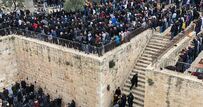
Sheikh Mohamed Hussein, Grand Mufti of Jerusalem and Palestine, has warned that Israel’s repeated attacks on the Aqsa Mosque and its premises will lead to a new Palestinian intifada (uprising).
In press remarks, Sheikh Hussein strongly denounced the entry of police officers to the Bab al-Rahma prayer area of the Aqsa Mosque without removing their shoes.
He also slammed the Israeli police for allowing settlers and Israeli officials to desecrate the Aqsa Mosque’s courtyards and perform Talmudic rituals, expressing his belief that such provocative practices would lead the tense situation to explode and would “trigger a religious revolution to defend the Mosque and the holy sites.”
The Mufti appealed to Jordan and Arab governments to urgently intervene to protect the Aqsa Mosque and its prayer areas against Judaization and to pressure Israel to stop interfering in the management of the Aqsa Mosque and the Islamic mortmain sites in Occupied Jerusalem.
In press remarks, Sheikh Hussein strongly denounced the entry of police officers to the Bab al-Rahma prayer area of the Aqsa Mosque without removing their shoes.
He also slammed the Israeli police for allowing settlers and Israeli officials to desecrate the Aqsa Mosque’s courtyards and perform Talmudic rituals, expressing his belief that such provocative practices would lead the tense situation to explode and would “trigger a religious revolution to defend the Mosque and the holy sites.”
The Mufti appealed to Jordan and Arab governments to urgently intervene to protect the Aqsa Mosque and its prayer areas against Judaization and to pressure Israel to stop interfering in the management of the Aqsa Mosque and the Islamic mortmain sites in Occupied Jerusalem.
3 mar 2019
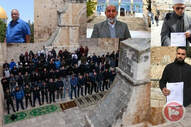
Israeli authorities delivered an order to Waqf Council chairman, Sheikh Abd al-Athim Salhab, banning him from entry to the Al-Aqsa Mosque compound for 40 consecutive days, on Sunday.
According to local sources, Israeli authorities handed the 40-day ban order to Salhab after he was previously banned for an entire week following his release from Israeli custody, last week.
Along with other top Waqf officials, Salhab was detained by Israeli forces as a result of playing an important role in the reopening of the al-Rahma Gate (Mercy Gate), one of the Al-Aqsa Mosque gates, by opening the doors of the hall to allow worshipers to perform Friday prayers inside.
Several Waqf employees also received orders banning them from entry to the Al-Aqsa Mosque compound for periods ranging between one week and six months.
The al-Rahma Gate is a big building that lays to the east of the Al-Aqsa, the Israeli authorities sealed the building in 2003 as it was the headquarters of the Islamic Heritage Committee; Israel had said at the time that the building was being used for political activities. In 2017, an Israeli court ordered that the building be closed until a further notice.
According to local sources, Israeli authorities handed the 40-day ban order to Salhab after he was previously banned for an entire week following his release from Israeli custody, last week.
Along with other top Waqf officials, Salhab was detained by Israeli forces as a result of playing an important role in the reopening of the al-Rahma Gate (Mercy Gate), one of the Al-Aqsa Mosque gates, by opening the doors of the hall to allow worshipers to perform Friday prayers inside.
Several Waqf employees also received orders banning them from entry to the Al-Aqsa Mosque compound for periods ranging between one week and six months.
The al-Rahma Gate is a big building that lays to the east of the Al-Aqsa, the Israeli authorities sealed the building in 2003 as it was the headquarters of the Islamic Heritage Committee; Israel had said at the time that the building was being used for political activities. In 2017, an Israeli court ordered that the building be closed until a further notice.
2 mar 2019
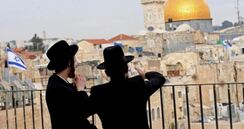
Al-Azhar institution in Cairo has strongly denounced Israel’s recent repressive measures in Occupied Jerusalem, including the detention of Jerusalemite citizens and repeated break-ins at the Aqsa Mosque.
In a statement on Friday, al-Azhar reiterated its support for the Jerusalemite people in their efforts to confront the Israeli arbitrary practices in Jerusalem, especially the intents to reclose the Bab al-Rahma prayer area of the Aqsa Mosque.
Al-Azhar affirmed that “the Aqsa Mosque with all its premises belongs exclusively to the Palestinian people and the Israeli occupation authority has not right to make changes to any part of it or try to divide it temporally or spatially.”
It urged all concerned parties to take urgent action to confront such Israeli measures in Jerusalem and support the Palestinian people’s struggle for the establishment of their independent state.
In a statement on Friday, al-Azhar reiterated its support for the Jerusalemite people in their efforts to confront the Israeli arbitrary practices in Jerusalem, especially the intents to reclose the Bab al-Rahma prayer area of the Aqsa Mosque.
Al-Azhar affirmed that “the Aqsa Mosque with all its premises belongs exclusively to the Palestinian people and the Israeli occupation authority has not right to make changes to any part of it or try to divide it temporally or spatially.”
It urged all concerned parties to take urgent action to confront such Israeli measures in Jerusalem and support the Palestinian people’s struggle for the establishment of their independent state.
26 feb 2019
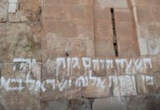
Illegal Israeli colonialist settlers wrote, Tuesday, racist graffiti on the outer walls of Bab ar-Rahma Mosque, adjacent to the eastern wall of the Al-Aqsa Mosque, in occupied East Jerusalem.
The incident took place just a few days after dozens of Palestinians managed to reopen the ar-Rahma Mosque for the first time since Israel closed it in the year 2003.
The Palestinians in the city called for mass gatherings around Bab ar-Rahma, outside the mosque, to hold prayers and affirm their right to the holy site.
The Israeli army then initiated an extensive campaign in which the soldiers stormed and searched many homes in the occupied city, and abducted dozens around 60 Palestinians.
Among the abducted Palestinians are several sheikhs and Imams, including two high-level officials with the mosque.
In related news, the Israeli police handed a Palestinian teacher, identified as Hanadi Halawani, and order preventing her from entering Al-Aqsa compound for six months.
Halawani was taken prisoner, Wednesday, after the soldiers stormed her home in Jerusalem, and took her to an interrogated facility, before releasing her later.
It is worth mentioning that the soldiers abducted, Tuesday, a Sheikh of the Al-Aqsa Mosque, identified as Ra’ed Da’na, near his home in Jerusalem, in addition to 21 other Palestinians across the occupied West Bank.
The incident took place just a few days after dozens of Palestinians managed to reopen the ar-Rahma Mosque for the first time since Israel closed it in the year 2003.
The Palestinians in the city called for mass gatherings around Bab ar-Rahma, outside the mosque, to hold prayers and affirm their right to the holy site.
The Israeli army then initiated an extensive campaign in which the soldiers stormed and searched many homes in the occupied city, and abducted dozens around 60 Palestinians.
Among the abducted Palestinians are several sheikhs and Imams, including two high-level officials with the mosque.
In related news, the Israeli police handed a Palestinian teacher, identified as Hanadi Halawani, and order preventing her from entering Al-Aqsa compound for six months.
Halawani was taken prisoner, Wednesday, after the soldiers stormed her home in Jerusalem, and took her to an interrogated facility, before releasing her later.
It is worth mentioning that the soldiers abducted, Tuesday, a Sheikh of the Al-Aqsa Mosque, identified as Ra’ed Da’na, near his home in Jerusalem, in addition to 21 other Palestinians across the occupied West Bank.
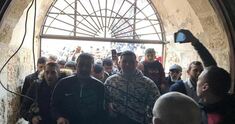
About 50 Aqsa Mosque guards on Tuesday entered Bab al-Rahma area of the Mosque to express their rejection of the detention and banishment campaign launched recently by the Israeli occupation police against them.
The Israeli police arrested a large number of Islamic Awqaf officials and Aqsa guards in Jerusalem after they participated in the opening of the Bab al-Rahma prayer area last Friday.
The most prominent Awqaf officials who received banishment orders were Sheikh Abdul-Adheem Salhab, head of the Islamic Awqaf Authority, and his deputy Najeh Bukairat.
The Israeli police arrested a large number of Islamic Awqaf officials and Aqsa guards in Jerusalem after they participated in the opening of the Bab al-Rahma prayer area last Friday.
The most prominent Awqaf officials who received banishment orders were Sheikh Abdul-Adheem Salhab, head of the Islamic Awqaf Authority, and his deputy Najeh Bukairat.
25 feb 2019
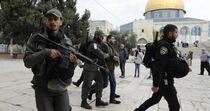
Below the Western media’s radar, tensions have been escalating in Israeli-occupied Jerusalem.
In the last week, a new confrontation has emerged over al-Aqsa Mosque compound, in the context of intensifying efforts by Israeli authorities and settlers to change the status quo and take over Palestinian properties in and around the Old City.
The Jordanian government recently decided to expand the composition of the Waqf – the body charged with managing al-Aqsa Mosque compound – to include a number of high-ranking Palestinians, alongside the long-standing Jordanian members.
Gates shuttered
The move came in response to what International Crisis Group’s Ofer Zalzberg described to Haaretz as “the erosion of the status quo” at the site, including the tolerance by Israeli occupation forces of “quiet worship” by Jews in the compound – “a relatively new development”, the paper noted.
Last Thursday, the newly expanded council inspected, and prayed at, a building located at the Gate of Mercy (Bab al-Rahma), shuttered by Israeli occupation authorities since 2003. At the time, the closure was justified on the grounds of alleged political activities and links to Hamas – but the building has remained closed ever since.
What is taking place in Jerusalem is 'an organised and systematic campaign of settlers, with the assistance of government agencies, to expel entire communities in East Jerusalem'
Overnight on Sunday, Israeli forces put new locks on metal gates that lead to the building. When Palestinian worshippers attempted to open the gates, clashes broke out, and a number of Palestinians were arrested by Israeli police.
Tuesday night saw renewed confrontations and arrests, while an Israeli court on Wednesday banned a dozen or so Palestinians from entering the compound. Both the Palestine Liberation Organisation and Hamas have condemned the developments, and warned of the “volatility” of the situation.
New facts on the ground
Events in the compound cannot be viewed in isolation from the bigger picture in Jerusalem, and in particular, what Israeli NGO Ir Amim has called an “accelerated, intensifying chain of new facts on the ground”, including “a mounting number of state-sponsored settlement campaigns inside Palestinian neighborhoods”.
One expression of such campaigns is the eviction of Palestinian families from their homes so that settlers can take possession of the properties. Last Sunday, the Abu Assab family was expelled from their home in the Muslim Quarter of the Old City, a fate facing hundreds more Palestinian families in occupied East Jerusalem.
What is taking place in Jerusalem is “an organised and systematic campaign of settlers, with the assistance of government agencies, to expel entire communities in East Jerusalem and to establish settlements in their stead”, in the words of an Israeli settlements’ monitor.
“It is very clear what they want: a Jewish majority here and in East Jerusalem,” Silwan-based activist Jawad Siyam told the Independent recently. His community is blighted by the presence of the settler-run “City of David” compound, which is set to receive a further boost from Israeli occupation authorities in the form of a planned cable-car station.
Jerusalem has largely been out of the headlines for awhile, with most attention – understandably – being paid to the Great March of Return protests in the Gaza Strip and the bogged-down efforts to secure relief from the blockade. Israeli elections are also on the horizon, and speculation continues over what precisely the Trump administration has got in store by way of a “peace plan”.
In the background, however, accelerated Israeli colonial policies in occupied East Jerusalem could be leading to a new boiling point.
Grassroots activism
The Waqf has stated that it seeks the opening of the Bab al-Rahma site, a demand that has the potential to become a focus for the kinds of mass protests witnessed in the summer of 2017. Then, metal detectors introduced by Israeli occupation authorities outside al-Aqsa Mosque compound sparked spontaneous demonstrations, with the devices ultimately removed.
Whether or not the Waqf chooses such a path, it could also find its hand forced by the pressure of grassroots activism; there is considerable concern among Palestinians that the Israeli government – along with the so-called “Temple movement” activists – are ultimately working towards a spatial division of, and establishment of formalized Jewish prayers within, al-Aqsa Mosque compound.
Meanwhile, the United States is proceeding with the closure of its consulate in East Jerusalem, and relocation of Palestinian “affairs” to an office within the new embassy – a potent symbol, were one needed, that the Trump administration’s vision will be a stark departure from even the pretense of a “two-state solution”, and a rubber-stamp for Israel’s de-facto, single state.
This week’s events – however they develop – are a reminder, however, that while Israel and the US see Jerusalem as fair game for an accelerated process of colonizationand deepening imposition of Israeli sovereignty, the city’s Palestinian residents are experienced spoilers of Israeli designs, and may well soon reprise such a role.
- Ben White is the author of ‘Israeli Apartheid: A Beginner’s Guide’ and ‘Palestinians in Israel: Segregation, Discrimination and Democracy’. He is a writer for Middle East Monitor, and his articles have been published by Al Jazeera, al-Araby, Huffington Post, The Electronic Intifada, The Guardian’s Comment is free, and more.
In the last week, a new confrontation has emerged over al-Aqsa Mosque compound, in the context of intensifying efforts by Israeli authorities and settlers to change the status quo and take over Palestinian properties in and around the Old City.
The Jordanian government recently decided to expand the composition of the Waqf – the body charged with managing al-Aqsa Mosque compound – to include a number of high-ranking Palestinians, alongside the long-standing Jordanian members.
Gates shuttered
The move came in response to what International Crisis Group’s Ofer Zalzberg described to Haaretz as “the erosion of the status quo” at the site, including the tolerance by Israeli occupation forces of “quiet worship” by Jews in the compound – “a relatively new development”, the paper noted.
Last Thursday, the newly expanded council inspected, and prayed at, a building located at the Gate of Mercy (Bab al-Rahma), shuttered by Israeli occupation authorities since 2003. At the time, the closure was justified on the grounds of alleged political activities and links to Hamas – but the building has remained closed ever since.
What is taking place in Jerusalem is 'an organised and systematic campaign of settlers, with the assistance of government agencies, to expel entire communities in East Jerusalem'
Overnight on Sunday, Israeli forces put new locks on metal gates that lead to the building. When Palestinian worshippers attempted to open the gates, clashes broke out, and a number of Palestinians were arrested by Israeli police.
Tuesday night saw renewed confrontations and arrests, while an Israeli court on Wednesday banned a dozen or so Palestinians from entering the compound. Both the Palestine Liberation Organisation and Hamas have condemned the developments, and warned of the “volatility” of the situation.
New facts on the ground
Events in the compound cannot be viewed in isolation from the bigger picture in Jerusalem, and in particular, what Israeli NGO Ir Amim has called an “accelerated, intensifying chain of new facts on the ground”, including “a mounting number of state-sponsored settlement campaigns inside Palestinian neighborhoods”.
One expression of such campaigns is the eviction of Palestinian families from their homes so that settlers can take possession of the properties. Last Sunday, the Abu Assab family was expelled from their home in the Muslim Quarter of the Old City, a fate facing hundreds more Palestinian families in occupied East Jerusalem.
What is taking place in Jerusalem is “an organised and systematic campaign of settlers, with the assistance of government agencies, to expel entire communities in East Jerusalem and to establish settlements in their stead”, in the words of an Israeli settlements’ monitor.
“It is very clear what they want: a Jewish majority here and in East Jerusalem,” Silwan-based activist Jawad Siyam told the Independent recently. His community is blighted by the presence of the settler-run “City of David” compound, which is set to receive a further boost from Israeli occupation authorities in the form of a planned cable-car station.
Jerusalem has largely been out of the headlines for awhile, with most attention – understandably – being paid to the Great March of Return protests in the Gaza Strip and the bogged-down efforts to secure relief from the blockade. Israeli elections are also on the horizon, and speculation continues over what precisely the Trump administration has got in store by way of a “peace plan”.
In the background, however, accelerated Israeli colonial policies in occupied East Jerusalem could be leading to a new boiling point.
Grassroots activism
The Waqf has stated that it seeks the opening of the Bab al-Rahma site, a demand that has the potential to become a focus for the kinds of mass protests witnessed in the summer of 2017. Then, metal detectors introduced by Israeli occupation authorities outside al-Aqsa Mosque compound sparked spontaneous demonstrations, with the devices ultimately removed.
Whether or not the Waqf chooses such a path, it could also find its hand forced by the pressure of grassroots activism; there is considerable concern among Palestinians that the Israeli government – along with the so-called “Temple movement” activists – are ultimately working towards a spatial division of, and establishment of formalized Jewish prayers within, al-Aqsa Mosque compound.
Meanwhile, the United States is proceeding with the closure of its consulate in East Jerusalem, and relocation of Palestinian “affairs” to an office within the new embassy – a potent symbol, were one needed, that the Trump administration’s vision will be a stark departure from even the pretense of a “two-state solution”, and a rubber-stamp for Israel’s de-facto, single state.
This week’s events – however they develop – are a reminder, however, that while Israel and the US see Jerusalem as fair game for an accelerated process of colonizationand deepening imposition of Israeli sovereignty, the city’s Palestinian residents are experienced spoilers of Israeli designs, and may well soon reprise such a role.
- Ben White is the author of ‘Israeli Apartheid: A Beginner’s Guide’ and ‘Palestinians in Israel: Segregation, Discrimination and Democracy’. He is a writer for Middle East Monitor, and his articles have been published by Al Jazeera, al-Araby, Huffington Post, The Electronic Intifada, The Guardian’s Comment is free, and more.
24 feb 2019
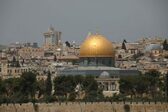
In the latest in a series of aggressive and provocative measures against the Al-Aqsa Mosque in Jerusalem, the third-holiest site in the Islamic religion, Israeli police on Sunday abducted two high-level officials with the mosque.
This comes a day after Israeli police abducted a security guard at the mosque as he was leaving work, and two days after abducting two young women who had come to the mosque to pray despite the Israeli military’s closure of entry to the mosque.
The two abducted officials are Sheikh Abdul Azim Salhab, the Head of the Council of Islamic Affairs and Holy Sites in Jerusalem, and Najih Bkirat, the Deputy Director General of the Islamic Endowments Department in Jerusalem.
Israeli officials then stated that they had made an administrative decision to have the two men removed from the Al Aqsa Mosque for seven days .
Mohammed Mahmoud, the lawyer for the Islamic Waqf (Endowment) which runs the holy site told reporters, “The Israeli police took a precautionary decision prior to the two officials’ appearance in an Israeli court, preemptively arresting them”.
The Israeli forces arrested Sheikh Salhab and Bkirat from their homes in occupied Jerusalem. They were later brought to the detention and interrogation center known as Muskoubiya, west of the holy city .
It is noteworthy that Sheikh Salhab helped lead the worshipers who reopened the building and chapel of Bab al-Rahma in Al-Aqsa on Friday. Also, the Islamic Waqf Council was restructured several weeks ago, and a decision was made that the organization should be headed by Sheikh Salhab.
Thr Jordanian Minister of Awqaf and Islamic Affairs Abdul Nasser Abu Al-Basal told reporters Sunday that the Israeli government’s decision to arrest the two men was “playing with fire”.
The full quote was as follows: “The arrest of the chairman of the Awqaf Council in Jerusalem, Sheikh Abdel-Azim Salhab, and the deputy director general of the Jerusalem Endowment, Najia Bkirat, directly affects the Jordanian role in the care of Islamic sanctities in Jerusalem. Israeli forces are playing with fire in these difficult circumstances. We demand their release quickly.”
This comes a day after Israeli police abducted a security guard at the mosque as he was leaving work, and two days after abducting two young women who had come to the mosque to pray despite the Israeli military’s closure of entry to the mosque.
The two abducted officials are Sheikh Abdul Azim Salhab, the Head of the Council of Islamic Affairs and Holy Sites in Jerusalem, and Najih Bkirat, the Deputy Director General of the Islamic Endowments Department in Jerusalem.
Israeli officials then stated that they had made an administrative decision to have the two men removed from the Al Aqsa Mosque for seven days .
Mohammed Mahmoud, the lawyer for the Islamic Waqf (Endowment) which runs the holy site told reporters, “The Israeli police took a precautionary decision prior to the two officials’ appearance in an Israeli court, preemptively arresting them”.
The Israeli forces arrested Sheikh Salhab and Bkirat from their homes in occupied Jerusalem. They were later brought to the detention and interrogation center known as Muskoubiya, west of the holy city .
It is noteworthy that Sheikh Salhab helped lead the worshipers who reopened the building and chapel of Bab al-Rahma in Al-Aqsa on Friday. Also, the Islamic Waqf Council was restructured several weeks ago, and a decision was made that the organization should be headed by Sheikh Salhab.
Thr Jordanian Minister of Awqaf and Islamic Affairs Abdul Nasser Abu Al-Basal told reporters Sunday that the Israeli government’s decision to arrest the two men was “playing with fire”.
The full quote was as follows: “The arrest of the chairman of the Awqaf Council in Jerusalem, Sheikh Abdel-Azim Salhab, and the deputy director general of the Jerusalem Endowment, Najia Bkirat, directly affects the Jordanian role in the care of Islamic sanctities in Jerusalem. Israeli forces are playing with fire in these difficult circumstances. We demand their release quickly.”
3 jan 2019
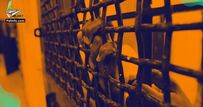
The Palestinian Captive Movement declared in a statement issued Thursday its intention to wage a new intifada in Israeli jails and detention centers in protest against the Israeli repressive measures.
The Palestinian prisoners are subjected to a new phase of repression threatening their lives, the statement reads, saying that they are held in conditions below international standards.
The Israeli escalated attacks against our prisoners came as part of the Israeli government’s election propaganda, according to the statement.
We will stand united towards Israeli repressive campaign, the Movement said, calling on Palestinian people to support their protest steps.
The Palestinian prisoners are subjected to a new phase of repression threatening their lives, the statement reads, saying that they are held in conditions below international standards.
The Israeli escalated attacks against our prisoners came as part of the Israeli government’s election propaganda, according to the statement.
We will stand united towards Israeli repressive campaign, the Movement said, calling on Palestinian people to support their protest steps.
Page: 2 - 1
